January 11, 2015
The Devil You Know by Elisabeth de Mariaffi
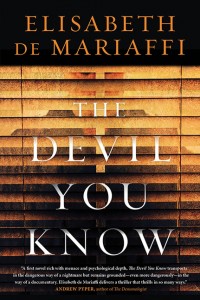 The stakes were high for Elisabeth de Mariaffi’s The Devil You Know. On Wednesday morning, I walked 2km at -25 degrees to get a copy, because I’d been hearing such good things about it and it seemed like exactly the kind of book you want to hang out with curled up warm while the blizzard howls. A mystery, a thriller, a book set in Southern Ontario during the 1980s and early ’90s, during which a series of young girls were kidnapped and sometimes found murdered, otherwise their faces depicted on posters for years afterwards under the heading, “Missing.” Years later, “aged-enhanced” images of these children would be updated, but we’d still recognize them. I’ve noticed that reviewers have been responding to the book personally, viscerally. There’s a whole generation of us haunted by these missing girls—I could plot my own history by theirs, from Nicole Morin to Alicia Ross. (I was too young to know about the disappearance and murder of Sharin’ Morningstar Keenan in 1983, though she was taken the very playground where my children play.)
The stakes were high for Elisabeth de Mariaffi’s The Devil You Know. On Wednesday morning, I walked 2km at -25 degrees to get a copy, because I’d been hearing such good things about it and it seemed like exactly the kind of book you want to hang out with curled up warm while the blizzard howls. A mystery, a thriller, a book set in Southern Ontario during the 1980s and early ’90s, during which a series of young girls were kidnapped and sometimes found murdered, otherwise their faces depicted on posters for years afterwards under the heading, “Missing.” Years later, “aged-enhanced” images of these children would be updated, but we’d still recognize them. I’ve noticed that reviewers have been responding to the book personally, viscerally. There’s a whole generation of us haunted by these missing girls—I could plot my own history by theirs, from Nicole Morin to Alicia Ross. (I was too young to know about the disappearance and murder of Sharin’ Morningstar Keenan in 1983, though she was taken the very playground where my children play.)
Evie Jones, rookie reporter and protagonist of The Devil You Know is similarly haunted, not least because she’s currently covering the Paul Bernardo case as he and his wife are arrested for the murders of Kristen French and Leslie Mahaffy in 1993. But also, in particular, because her own childhood best friend was one of the dead girls, Lianne Gagnon, whose story is a fiction conflating the cases of Keenan and Allison Parrott, who was last seen getting into a car with a strange man near Varsity Stadium eleven years before. Leanne’s killer was never found. And when a strange man begins appearing on Evie’s fire escape and elsewhere, a dark figure skirting on the periphery of her life, she begins to wonder if it’s Lianne’s killer returned and if there’s something that he wants from her. Her fears are dismissed by those around her, but she can’t shake the feeling that she’s under threat, and no wonder—her own history, and the stories of women in the world that she covers in her job, do absolutely nothing to suggest otherwise.
It is suggested—perhaps too strongly, my one criticism of this book, for the signs are there and the reader surely can read them—that Evie’s job as a crime reporter is part of her need to control the forces in her life, that she seeks out stories like Bernardo’s and the stories in missing and dead girls, in order to be in command of the narrative for once. And by those concerned for Evie’s wellbeing, it is suggested too that her need for control is a bad thing, that it’s detrimental to her mental health, and that it’s this desperation making her imagine the footsteps at the door… I mean, never mind the actual footsteps at the door.
But with Evie, de Mariaffi dares to posit instead that female agency is a salve instead of a symptom. Evie Jones is far from perfect, but she’s smart, unflinching, shameless, and brave. The hero of her own story, certainly.
In her research, employing a brand new tool called the internet, Evie starts looking back at the records of what happened to her friend, and learns that there is more to the story than she ever knew. The big picture that emerges as she puts pieces together begins to suggest that the story of Lianne’s disappearance is less random than Evie ever supposed, and that she can trace the case back to a place that’s closer to home than she can bare to imagine. And that all the trouble (and the footsteps) might not be in her head after all.
The Devil You Know is a gripping, fast-paced book that I had to be torn away from, an excellent crime book with strong female protagonists, in scintillating company with those by Laura Lippman and Gillian Flynn. But there is more to it than that. More than just nostalgia too, though it’s a part of it. de Mariaffi was long-listed for the Giller prize a couple of years ago for her short story collection, How to Get Along With Women, which included her acclaimed short story, “Kiss Me Like I’m the Last Man on Earth,” which I first read in The New Quarterly. And while it seemed like a leap for a writer to go from literary short stories to a thriller, once I began reading The Devil…, the connection seemed quite straightforward to me. Partly because of the nostalgia that infuses both the novel and the story, 1980s Toronto in startling specificity. But also because of how much short story writing sets one up to write a plot driven novel—this has never occurred to me before.
Short stories are all about atmosphere and their scenes, one moment standing in for many, representative of a broader picture. Nothing is extraneous, and so too is it with a crime novel, plot-driven, which just really means one scene after another. Though perhaps with some writers and books, the reader doesn’t notice the scene, so preoccupied is she by plot, but the scenes stand out in The Devil You Know. A gripping, fast-paced book that I had to be torn away from, and I kept noticing the scenes, which were like tiny short stories contained within. The plot is the book’s foundation, but the story rises far and large above it.
It was terrific, and definitely worth a walk in the cold.
January 8, 2015
Vacation Reads Part 2: All the Best/All the Rest
I don’t actually care about the weather, or the accommodations, or the buffet. If the books are no good, then the vacation is ruined. And this is never more important than when one is vacationing at home, as I was over the holidays. I finished reading Marilynne Robinson’s Lila on Christmas Eve, confident that the flat rectangular packages under our Christmas tree would yield great reading, and was I ever right.
 The first book I set to reading was An Exact Replica of a Figment of My Imagination, by Elizabeth McCracken, which I read in a day, and this meant that I spent all day Christmas being discovered hiding with my paperback, weeping, and exclaiming, “This book is just so good.” Stuart felt bad at first: “I got you a book that makes you sad.” But I shushed him. The sadness was important, but not the point. That I was weeping was a testament to this book, whose resistance of sentimentality is most remarkable. And it was also funny. Plus, brilliant. A memoir by the author of Thunderstruck and Other Stories, which was one of my top books of 2014. It’s the story that bridges the stillbirth of her first child with the birth of her second, a healthy boy, a year later, and it probes the edges of motherhood and humanity in a way that’s so important because few storytellers go to these places, where so many people go all the time. I’d recommend this book to anyone who is literate—no experience or interest in the subject matter required. It is a truly extraordinary memoir. I can’t wait to read McCracken’s other books.
The first book I set to reading was An Exact Replica of a Figment of My Imagination, by Elizabeth McCracken, which I read in a day, and this meant that I spent all day Christmas being discovered hiding with my paperback, weeping, and exclaiming, “This book is just so good.” Stuart felt bad at first: “I got you a book that makes you sad.” But I shushed him. The sadness was important, but not the point. That I was weeping was a testament to this book, whose resistance of sentimentality is most remarkable. And it was also funny. Plus, brilliant. A memoir by the author of Thunderstruck and Other Stories, which was one of my top books of 2014. It’s the story that bridges the stillbirth of her first child with the birth of her second, a healthy boy, a year later, and it probes the edges of motherhood and humanity in a way that’s so important because few storytellers go to these places, where so many people go all the time. I’d recommend this book to anyone who is literate—no experience or interest in the subject matter required. It is a truly extraordinary memoir. I can’t wait to read McCracken’s other books.
 The other book I got for Christmas was the essay collection The Unspeakable, by Meghan Daum, which tied into the McCracken memoir in its probing of edges. (Daum is also editor of the essay anthology Selfish, Shallow & Self-Absorbed: Sixteen Writers on the Decision Not to Have Kids, out in March.) These essays are also about the things nobody talks about—what really happens when your mother dies, particularly if your relationship has always been fraught; what we’re looking for in dating and relationships, and in marriage; about nostalgia (though, truthfully, everybody talks about that) and about how the soundtrack to your twenties becomes “unbearable to listen to in twenty years…not because they…sound dated and trite but because they…sound like the lining of your soul”); about filling the supposed space in one’s life by not having children; on being “an honorary dyke”; playing charades with Nicole Kidman and Nora Ephron; being in a coma (last two examples in which “unspeakableness” becomes literal). Truthfully, some parts of these pieces flirted around the edges of the mundane, and really the guiding principle of these essays is their singular point of view, by the contrarian misfit, Daum, an excellent writer who examines everything critically, including her own insatiable thirst for discovering an authentic way to be in the world. There is a point to everything.
The other book I got for Christmas was the essay collection The Unspeakable, by Meghan Daum, which tied into the McCracken memoir in its probing of edges. (Daum is also editor of the essay anthology Selfish, Shallow & Self-Absorbed: Sixteen Writers on the Decision Not to Have Kids, out in March.) These essays are also about the things nobody talks about—what really happens when your mother dies, particularly if your relationship has always been fraught; what we’re looking for in dating and relationships, and in marriage; about nostalgia (though, truthfully, everybody talks about that) and about how the soundtrack to your twenties becomes “unbearable to listen to in twenty years…not because they…sound dated and trite but because they…sound like the lining of your soul”); about filling the supposed space in one’s life by not having children; on being “an honorary dyke”; playing charades with Nicole Kidman and Nora Ephron; being in a coma (last two examples in which “unspeakableness” becomes literal). Truthfully, some parts of these pieces flirted around the edges of the mundane, and really the guiding principle of these essays is their singular point of view, by the contrarian misfit, Daum, an excellent writer who examines everything critically, including her own insatiable thirst for discovering an authentic way to be in the world. There is a point to everything.
 Next, I reread The Witch of Exmoor by Margaret Drabble because, while she is one of my favourite authors, most of her output has in fact faded into a blur in my mind and I need to revisit many of them to remember what was what. It is possible that the books that had faded aren’t her best—that the fading is a mark of the books rather than my reading. Exmoor didn’t blow my mind. It received some poor reviews when it was published in 1996, James Wood contending that her Dickensian project lacked the depth of the original, that her characters were never allowed to be fully developed human beings and rather were pieces their author moved around on a game board. Though this is actually what I love best about Drabble’s work, her command of her fictional universe, the metafictional elements. I wonder if the novel was a victim of timing though: a year later was Labour’s election victory on the UK, the advent of the internet would also bring about rapid change. Her portrayal of “the way we live now” was almost so much on the cusp of something that the cusp itself seems less relevant in retrospect.
Next, I reread The Witch of Exmoor by Margaret Drabble because, while she is one of my favourite authors, most of her output has in fact faded into a blur in my mind and I need to revisit many of them to remember what was what. It is possible that the books that had faded aren’t her best—that the fading is a mark of the books rather than my reading. Exmoor didn’t blow my mind. It received some poor reviews when it was published in 1996, James Wood contending that her Dickensian project lacked the depth of the original, that her characters were never allowed to be fully developed human beings and rather were pieces their author moved around on a game board. Though this is actually what I love best about Drabble’s work, her command of her fictional universe, the metafictional elements. I wonder if the novel was a victim of timing though: a year later was Labour’s election victory on the UK, the advent of the internet would also bring about rapid change. Her portrayal of “the way we live now” was almost so much on the cusp of something that the cusp itself seems less relevant in retrospect.
 And then I read Man at the Helm by Nina Stibbe, the first novel by author of the epistolary memoir Love, Nina. It’s possible that my aversion to the Drabble was too much heavy for holiday, and Man at the Helm was a perfect counter. Nancy Mitford meets Sue Townsend, the story of Lizzie Vogel, a young girl whose wealthy parents divorce in the 1970s, the children and their mother relocating to a Leicestershire village whose inhabitants are hostile to newcomers, in particular households without “a man at the helm.” And so Lizzie and her sister hatch a plot to find their mother a new man, a plan that has the unintended consequence of their mother sleeping with half the husbands in the village, doing her reputation not much good. Oh, it was so funny, and I loved it.
And then I read Man at the Helm by Nina Stibbe, the first novel by author of the epistolary memoir Love, Nina. It’s possible that my aversion to the Drabble was too much heavy for holiday, and Man at the Helm was a perfect counter. Nancy Mitford meets Sue Townsend, the story of Lizzie Vogel, a young girl whose wealthy parents divorce in the 1970s, the children and their mother relocating to a Leicestershire village whose inhabitants are hostile to newcomers, in particular households without “a man at the helm.” And so Lizzie and her sister hatch a plot to find their mother a new man, a plan that has the unintended consequence of their mother sleeping with half the husbands in the village, doing her reputation not much good. Oh, it was so funny, and I loved it.
 And then my final holiday read was The Housekeeper and the Professor by Yoko Ogawa, which I plucked off the shelf at Book City because I liked the cover, and I loved the book for that reason very much before I read it, and then I read it, and there were other reasons. That it was a translation, first, which meant I was succeeding at my New Year’s Resolution before the New Year had even started. I also like that it was another book I read in a day, which is one of my great pleasures. It’s the story of a housekeeper who works for a former professor of mathematics with a brain injury that means he has a short-term memory of only 80 minutes, but the professor is taken with her young son, he teaches them both about the poetry of numbers, and the three of them together form a tenuous family unit for a while, a remarkable equation, the opposite of their previously lonely lives.
And then my final holiday read was The Housekeeper and the Professor by Yoko Ogawa, which I plucked off the shelf at Book City because I liked the cover, and I loved the book for that reason very much before I read it, and then I read it, and there were other reasons. That it was a translation, first, which meant I was succeeding at my New Year’s Resolution before the New Year had even started. I also like that it was another book I read in a day, which is one of my great pleasures. It’s the story of a housekeeper who works for a former professor of mathematics with a brain injury that means he has a short-term memory of only 80 minutes, but the professor is taken with her young son, he teaches them both about the poetry of numbers, and the three of them together form a tenuous family unit for a while, a remarkable equation, the opposite of their previously lonely lives.
January 6, 2015
Further Adventures in Accidental Cakery
 “To me, the grounds for hope are simply that we don’t know what will happen next, and that the unlikely and the unimaginable transpire quite regularly.” —Rebecca Solnit, “Woolf’s Darkness”
“To me, the grounds for hope are simply that we don’t know what will happen next, and that the unlikely and the unimaginable transpire quite regularly.” —Rebecca Solnit, “Woolf’s Darkness”
Today was a day so firmly determined to shrug off its plan that all one can really do is shrug one’s shoulders…and eat dessert.
I have a babysitter on Tuesday mornings, who called last night to cancel because she was ill. Which I thought meant I’d lose some productivity today, but I didn’t know the half of it. When we woke up this morning, the furnace was broken and the temperature down to 15 degrees. With the wind-chill, today felt like -17 outside, so this was troubling news. Luckily, our landlords were on it, and I was grateful that the babysitter would not have arrived at our freezing house after all. Iris and I took Harriet to school, and then we came home to await the serviceperson’s arrival. For about 10 minutes after we came out of the -17, the house actually felt warm, but then it got cold again even though I was wearing multiple layers of clothing, tights under my pants. The only option left then was to put something in the oven.
So I decided to make a cake. But it couldn’t be just any cake. We’ve had far too much in the way of baked goods over the past month and I’d sort of vowed to take a cake break, but then what else does one put in oven’s oven? I had absolutely nothing in the way of things to stew. So cake it was, but quinoa cake, I decided, because quinoa has been sitting in my cupboard for ages. (Although it was actually in the fridge, where we store all our grains to stymy inevitable infestations of mice and moths. Harriet thinks it’s weird that some families keep cereal in the cupboard. She’s never had a krispie that wasn’t chilled. Anyway…)
Quinoa sounded healthier than ordinary chocolate cake, at least. Except that it called for 4 eggs and we have no eggs. So I made it with flax meal sub’d for the four eggs. And coconut oil for the butter (and the coconut oil had frozen!). A quinoa cake didn’t sound all that promising in the first place, and all my sorry doctoring would do it no favours. I put it in my bundt pan (and how I love my bundt pan) where it baked for nearly two hours, and refused to be cooked all the way through. Mission accomplished though: I’d heated the kitchen most of the morning. Still no furnace serviceperson yet.
We’d lost another degree when I contacted our landlord to let her know that they’d not yet arrived. She heard back from them: they HAD come in the morning but knocked at my neighbour’s door and not ours, and didn’t call when they got no answer. She spent 40 minutes on the phone with the company, who told her that the serviceperson could return to our house tonight between 8 and 11pm. Unrelentingly, she stayed on the phone, where they finally agreed to return sooner but only at 3pm, when I leave to go pick up Harriet from school. And so I was charged with finding someone else to fetch Harriet from school, which I knew was going to be trouble—Harriet lives in perpetual fear that I’m not going to pick her up because I was late once in September 2013. Finally, both my landlord AND I found (different) kind neighbours willing to fetch Harriet, which led to more back and forthing as we sorted out the surfeit of human kindness.
The serviceperson finally arrived soon after Iris had awoken from the nap she was taking upstairs with a space heater. We had to chase him down before he left again, which wasn’t aided by the fact that Iris refused to be clothed in outerwear of any kind, and so I had to carry her out wrapped in Stuart’s hoodie. And then Iris and I had to spend 30 minutes in the basement bachelor apartment (where the furnace is) which had no place to sit down except the legendary sex bed (which I know well from sound through the air vents) and I didn’t feel exactly comfortable having Iris sit on that bed, but we had no choice. It was made, at least. She watched Elmo videos on my phone and ate goldfish crackers while I stared at at the serviceperson’s sizeable bum (and thankfully, it was not a plumber’s).
I asked him if all the furnaces broke on the coldest day of the year, and he said that tomorrow was actually the coldest day of the year, so we were getting our trouble out of the way early.
And then he was finally done, and I rushed out to find Harriet (not before putting Iris in snow pants and a jacket), who was being brought home by a classmate’s mother, but I went up the wrong street and missed them and was informed by the saintly crossing guard at Bloor and Spadina that Harriet had passed by her corner about five minutes before. So I had to run back home in the -17, and finally found Harriet in front of our house. Where we had heat again and Harriet was home, and so order was all restored, but I had accomplished absolutely nothing in the entire day, except for a really weird quinoa cake, so we sat down to eat it.
It wasn’t bad. Mushy in the middle, and really really rich. “If the furnace hadn’t broken, this cake wouldn’t exist,” I thought, as Iris found a knife and actually cut herself a second piece. I gave another to Harriet too, and then they wanted thirds, but I drew the line—quinoa, yes, but it had a cup of cocoa and even more sugar— and so they both crawled under the table and proceeded to eat the crumbs. They were down there for ages, and the licked the floor completely clean. I’ve never seen them so ravenous for anything.
Stuart came home and the house was in disarray, but we were reading stories, and everything seemed to be settling down. We were having a pasta dinner that involved boiling water and squeezing a lemon, so that was good, and then I remembered that tomorrow is pizza day, which is even better—no lunch to make. And once the pasta was eaten, we finished the cake, the whole thing (save for the quarter I gave to Harriet’s classmate’s mom for bringing her home, wrapped in tinfoil).
I am beginning to think there may be an order to the universe after all, and that accidental cake is part of it, most certainly.
January 6, 2015
Vacation Reads Part 1: Marilynne Robinson
 And now I am going to lay down a path, book by book, of how I made my way through a vacation packed with spectacular reads. It helped that I went on reading vacation a week or so before my actual vacation, abandoning myself to the task of reading all Marilynne Robinson’s novels in order. I really loved Housekeeping, and was taken by its magic and gothic sensibility. I was wary of Gilead though, as I always have been. It just didn’t seem like a book for me. But while I found it slow to start, I eventually came to appreciate it very much, and found John Ames’ worldview so admirable and beautiful, but then I was wary of that too—was I reading this like an old-age New-Age self-help guide to understanding how the world is? It is possible that I actually read all novels this way, but Gilead was so conspicuously in its, well, preachiness. Which I don’t mean as a criticism, actually. John Ames would have been an extraordinary preacher. But it is okay that I was underlining lines like they were delivered by a deity? Doesn’t this make me not far from someone who puts post-its in Chicken Soup for the Soul? So I am conflicted, but then so is Ames, which is the power of his point of view, actually. There is much subtlety at work here. That makes me nervous too. Anyway, I liked this book.
And now I am going to lay down a path, book by book, of how I made my way through a vacation packed with spectacular reads. It helped that I went on reading vacation a week or so before my actual vacation, abandoning myself to the task of reading all Marilynne Robinson’s novels in order. I really loved Housekeeping, and was taken by its magic and gothic sensibility. I was wary of Gilead though, as I always have been. It just didn’t seem like a book for me. But while I found it slow to start, I eventually came to appreciate it very much, and found John Ames’ worldview so admirable and beautiful, but then I was wary of that too—was I reading this like an old-age New-Age self-help guide to understanding how the world is? It is possible that I actually read all novels this way, but Gilead was so conspicuously in its, well, preachiness. Which I don’t mean as a criticism, actually. John Ames would have been an extraordinary preacher. But it is okay that I was underlining lines like they were delivered by a deity? Doesn’t this make me not far from someone who puts post-its in Chicken Soup for the Soul? So I am conflicted, but then so is Ames, which is the power of his point of view, actually. There is much subtlety at work here. That makes me nervous too. Anyway, I liked this book.
 I moved on to Home, which was a reread, and which turned out to be the book I liked least of the lot. While I did find it interesting to read the two books side-by-side and see how differently characters’ behaviour was interpreted by the others than what they’d intended (and the idea that came to me while I was reading KD Miller’s All Saints last summer: that we are all figments of one another’s imaginations after all), I found Home to be a bit agonizing in its repetitiveness and melodrama. Due to being on vacation and sick, I watched the stupid by entertaining movie, “They Came Together” starring Amy Poehler and Paul Rudd as I was reading Home, and maybe it was partly the head cold, but when I picked up the book again, it similarly seemed to be a spoof of sentimentality, just one darn thing after another. I don’t know if an Amy Poehler vehicle has ever been used to critique a Marilynne Robinson book before, and maybe this is my one real act of originality in this life. It is possible that reading Home and Gilead so close together wasn’t a great move after all, and perhaps I was just bored of the storyline? I do find it interesting that Gilead won the Pulitzer and Home won the Orange Prize, and I’m thinking, come on women’s fiction prize, you’ve got to up your game.
I moved on to Home, which was a reread, and which turned out to be the book I liked least of the lot. While I did find it interesting to read the two books side-by-side and see how differently characters’ behaviour was interpreted by the others than what they’d intended (and the idea that came to me while I was reading KD Miller’s All Saints last summer: that we are all figments of one another’s imaginations after all), I found Home to be a bit agonizing in its repetitiveness and melodrama. Due to being on vacation and sick, I watched the stupid by entertaining movie, “They Came Together” starring Amy Poehler and Paul Rudd as I was reading Home, and maybe it was partly the head cold, but when I picked up the book again, it similarly seemed to be a spoof of sentimentality, just one darn thing after another. I don’t know if an Amy Poehler vehicle has ever been used to critique a Marilynne Robinson book before, and maybe this is my one real act of originality in this life. It is possible that reading Home and Gilead so close together wasn’t a great move after all, and perhaps I was just bored of the storyline? I do find it interesting that Gilead won the Pulitzer and Home won the Orange Prize, and I’m thinking, come on women’s fiction prize, you’ve got to up your game.
 And then I read Lila, and I am so glad that I read all the others before because they really are a cycle, bringing us back to womanhood, daughterhood, motherhood, transiency, and a certain wildness. If The Grapes of Wrath married Gilead, this is what they’d come up with. I think what I like about Lila and Gilead over Housekeeping is that both are so engaged with the world instead of apart from it, and engagement does not require certainty. Ames and Lila really are such perfect companions, even if gaps in language and emotion keeps this from being articulated from one to the other, which is certainly a kind of faith. I suppose any marriage is.
And then I read Lila, and I am so glad that I read all the others before because they really are a cycle, bringing us back to womanhood, daughterhood, motherhood, transiency, and a certain wildness. If The Grapes of Wrath married Gilead, this is what they’d come up with. I think what I like about Lila and Gilead over Housekeeping is that both are so engaged with the world instead of apart from it, and engagement does not require certainty. Ames and Lila really are such perfect companions, even if gaps in language and emotion keeps this from being articulated from one to the other, which is certainly a kind of faith. I suppose any marriage is.
And I started underlining John Ames’ sermons again: “Life on earth is difficult and grave, and marvellous. Our experience is fragmentary. Its parts don’t add up. They don’t even belong in the same calculation. Sometimes it is hard to believe they are all parts of one thing. Nothing makes sense until we understand that experience does not accumulate like money, or memory, or like years and frailties.”
I think I will definitely have to read Lila again, this time while not so doped up on Marilynne Robinson, because it’s certainly a novel that deserves to be considered in its own right. Confession: I didn’t adore it. I don’t think I’ve quite cracked its surface yet. I also find myself at a distance from it, as I do Gilead. Both books find me unsteady as a reader, but I think that is a good thing. So I will return to it, which is the best thing about books, how you can do so over and over.
Now stay tuned for Part II of my Vacation Reads which includes (get ready for it!) the books I got for Christmas. So good.
January 4, 2015
Rose’s Run by Dawn Dumont
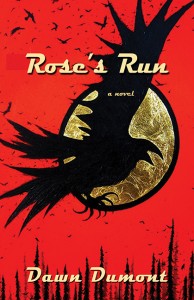 Well, if a holiday has to eventually end, Rose’s Run by Dawn Dumont is a pretty good book to go out on, a book that’s funny, breezy and heartwarming, and then manages to include a terrifying demon in the mix who feeds on the strength of women, so I was hooked in a cannot-turn-out-the-light-until-I’m-done kind of way, an I’m-going-to-have-nightmares kind of way (and I did!), and I haven’t been so gripped a scary book since I read The Troop by Craig Davidson/Nick Cutter a year ago.
Well, if a holiday has to eventually end, Rose’s Run by Dawn Dumont is a pretty good book to go out on, a book that’s funny, breezy and heartwarming, and then manages to include a terrifying demon in the mix who feeds on the strength of women, so I was hooked in a cannot-turn-out-the-light-until-I’m-done kind of way, an I’m-going-to-have-nightmares kind of way (and I did!), and I haven’t been so gripped a scary book since I read The Troop by Craig Davidson/Nick Cutter a year ago.
But let’s back up a bit. The novel begins with Rose Okanese, a First Nations woman living on a reserve in rural Saskatchewan, catching her husband bonking her cousin (and his), and then him taking off with their car so she has no way to get to work at the pig-farm. She loses her job, and has also just caught her teenage daughter doing drugs—troubles compounding. And to further compound them, Rose—through a series of misunderstandings—starts a rumour that she’s going to be running in the reserve’s annual marathon. More than a few pounds overweight and a heavy smoker, Rose is an unlikely candidate for the race, but she eventually starts training, one foot in front of the other, a seemingly insurmountable challenge, but perhaps the one thing in her world she has any control over.
If things could get any worse, it seems that her daughter and her troubled friend have managed to raise a demon from the dead, a spirt called “The Dream Woman” who feeds on the strength of the women around her and seeks vengeance for the many wrongs done to them by men. One by one, the women on the reserve become possessed by the woman’s spirit, but somehow Rose remains immune—perhaps because of the extent of her own strength as she begins to get stronger, and also somehow due to the ghost of her mother who remains a protective presence.
Soon, the marathon is the least of Rose’s problems as she is forced to battle with The Dream Woman, freeing the local women from her power (and the local men from their brutal justice), protecting her daughters in the process and sending the spirit back into the earth where she came from.
Kind of preposterous, yes, but Dawn Dumont (a comedian and broadcaster whose first novel, Nobody Cries at Bingo, was shortlisted for two Alberta book awards) balances the supernatural elements with real emotional connections between her characters, Rose’s down to earth point of view, and a wonderful ribald sense of humour. I’ve never encountered a book that managed to be hilarious and terrifying at once—and the humour never ceases, even when the suspense is at its height, but it never gets too silly either. Which makes for a really fantastic and engaging read.
While Rose’s Run would have benefitted from a stronger edit (I stumbled on a few typos and errors; the prose could have been tighter), any problems didn’t detract from my enjoyment of the novel. I read the book with an awareness of Julie Flett’s recent comments on the importance of First Nations literature:
“Our First Nation, Métis, and Inuit communities vitally need books with text and artwork that reflect our cultures and realities. Our works are also critical resources for increasing awareness and understanding in Canadian society, contributing relevancy to literacy programs, improving curricula, at all levels, across Canada, and adding significantly to the body of Canadian literature.”
There is nothing polemical about the novel at all, but not far beneath its breezy style and humour, it certainly is political, depicting the complicated reality of life on First Nations’ reserves, and in particular the status of First Nations women (whose problems at their most extreme and not so rarely either have led to the disappearance and/or murder of more than a thousand of these people in the last two decades). Now is certainly a time in which Canadian First Nations women seem to be finally starting to receive what they’re due—see the recent critical response to the television show, “Mohawk Girls“‘; the potential for a book by a First Nations woman to be part of the Canada Reads lineup for the very first time; the Native Women’s Association of Canada receiving the 2014 Vox Libera Award from Canadian Journalists for Free Expression, and more—and a book like Rose’s Run is an inspiring part of this cultural wave.
But it’s also just a really good book, and one I read avidly. A very good way to begin a new reading year.
January 3, 2015
Christmas Vacation
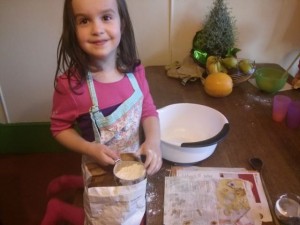 One of many reasons that members of our family are unlikely to ever take the world by storm is that our greatest talents really are for leisure—we’re experts at doing nothing, or just enough of something with requisite amounts of sofa-lying for good measure. We often visit cultural institutions such as museums and art galleries but rarely for more than an hour or two at a time, and never without a trip to the cafe AND the gift shop. Going out for lunch is our main occupation, and we always have dessert. We are really very good at enjoying ourselves, and so the last two weeks have been an absolute pleasure.
One of many reasons that members of our family are unlikely to ever take the world by storm is that our greatest talents really are for leisure—we’re experts at doing nothing, or just enough of something with requisite amounts of sofa-lying for good measure. We often visit cultural institutions such as museums and art galleries but rarely for more than an hour or two at a time, and never without a trip to the cafe AND the gift shop. Going out for lunch is our main occupation, and we always have dessert. We are really very good at enjoying ourselves, and so the last two weeks have been an absolute pleasure.
Two things: first, that I finished things up so that there was no work at all to be done for a week or so, and second, we turned off the internet. For a week, there was no checking of email or twitter, which opened up vast pockets of time in every day for all kinds of things—reading, playing, baking, carol-singing, and doing the Globe & Mail holiday crossword. On Tuesday we bought the newspaper because we were curious about what had gone on in the world, and it was odd to flip through the pages and discover news items we hadn’t heard about elsewhere.
 We spent the first couple of days of our holiday trying in vain to kick the cold that’s been embedded in our heads since the beginning of December. On the Sunday, we went down to the Bay on Queen Street to look at the Christmas windows, which were wonderful, and then went into the store and realized that department stores were the perfect way to reconcile our hatred of shopping malls with the joys of Christmas consumption (glittery lights, perfume smells, shopping bags with string handles, and 1 kilo tins of chocolate. Also, I now own tights without holes in the feet). Speeding home on the subway in time for Iris’s nap and for me to meet friends for an exquisite afternoon tea at Dessert Trends Bistro.
We spent the first couple of days of our holiday trying in vain to kick the cold that’s been embedded in our heads since the beginning of December. On the Sunday, we went down to the Bay on Queen Street to look at the Christmas windows, which were wonderful, and then went into the store and realized that department stores were the perfect way to reconcile our hatred of shopping malls with the joys of Christmas consumption (glittery lights, perfume smells, shopping bags with string handles, and 1 kilo tins of chocolate. Also, I now own tights without holes in the feet). Speeding home on the subway in time for Iris’s nap and for me to meet friends for an exquisite afternoon tea at Dessert Trends Bistro.
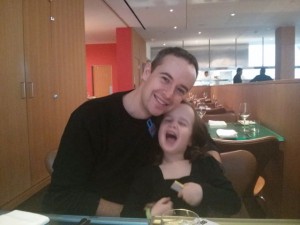 On Monday, we went to the library (because holidaying doesn’t always have to happen on a lavish scale) and then had smoked meat lunch at Caplansky’s Deli. I also went out for dinner with my friends and drank far too much wine. On Tuesday, I don’t think we did anything, partly due to the wine. Throughout all of this, Stuart and I were watching movies and episodes of Midsomer Murders in the evening (because we are 85 years old) and Harriet watched How to Train Your Dragon Two during Iris’s nap times. On Christmas Eve, we went to the Art Gallery to see the Art Spiegelman exhibit and had a lovely brunch at the Frank Restaurant, which we save for the specialist of occasions. On the way home, we picked up our turkey, which we fastened into our stroller. That evening, we had chicken fajitas for Christmas Eve dinner for the 10th year in a row, and left a snack for Santa.
On Monday, we went to the library (because holidaying doesn’t always have to happen on a lavish scale) and then had smoked meat lunch at Caplansky’s Deli. I also went out for dinner with my friends and drank far too much wine. On Tuesday, I don’t think we did anything, partly due to the wine. Throughout all of this, Stuart and I were watching movies and episodes of Midsomer Murders in the evening (because we are 85 years old) and Harriet watched How to Train Your Dragon Two during Iris’s nap times. On Christmas Eve, we went to the Art Gallery to see the Art Spiegelman exhibit and had a lovely brunch at the Frank Restaurant, which we save for the specialist of occasions. On the way home, we picked up our turkey, which we fastened into our stroller. That evening, we had chicken fajitas for Christmas Eve dinner for the 10th year in a row, and left a snack for Santa.
 Christmas was so good. Not only did we not have to leave the house, but we got to have my mom come and visit! The children got excellent presents and had fun playing with them throughout the holidays. I received great books, nice clothes, and other lovely things, including a La Cruset butter dish I’d been hankering after and new Pyrex. We all also received new CDs (because are 85 years old and like to do 20th century things) and so the holiday has been extra-filled with music—some of which was even made after 1987, which is very rare for us. My mom arrived and played with the children (which was not very difficult—she arrived bearing her present of a trunk full of dress-up clothes) while Stuart and I set about cooking the best Christmas dinner ever. The joys of Skype brought us the company of Nana and Granddad in England, and our adorable Alberta relations.
Christmas was so good. Not only did we not have to leave the house, but we got to have my mom come and visit! The children got excellent presents and had fun playing with them throughout the holidays. I received great books, nice clothes, and other lovely things, including a La Cruset butter dish I’d been hankering after and new Pyrex. We all also received new CDs (because are 85 years old and like to do 20th century things) and so the holiday has been extra-filled with music—some of which was even made after 1987, which is very rare for us. My mom arrived and played with the children (which was not very difficult—she arrived bearing her present of a trunk full of dress-up clothes) while Stuart and I set about cooking the best Christmas dinner ever. The joys of Skype brought us the company of Nana and Granddad in England, and our adorable Alberta relations.
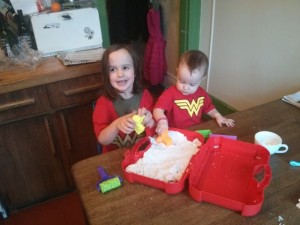 On Boxing Day, we went to the ROM, and partook in a yummy dinner of leftovers—Stuart makes the best turkey sandwiches on earth. Iris also slept until 7am for the first time in her whole life, which was mind-blowing, but also a bit terrible because when her sleep for the subsequent week was abysmal, I wanted to pitch her out the window. The next day, my dad and his partner arrived, and we all had an excellent time with them. And they played with the children while Stuart and I cooked up another very good meal—the greatest turkey pot pie of all time whose secret recipe was duck fat. The day after that, we drove out to my aunt’s in the West end, stopping en-route to buy ice-skates for Harriet and I, which had the potential to be a boondoggle. And then we had a very fun dinner with the best kinds of relations on earth—cousins.
On Boxing Day, we went to the ROM, and partook in a yummy dinner of leftovers—Stuart makes the best turkey sandwiches on earth. Iris also slept until 7am for the first time in her whole life, which was mind-blowing, but also a bit terrible because when her sleep for the subsequent week was abysmal, I wanted to pitch her out the window. The next day, my dad and his partner arrived, and we all had an excellent time with them. And they played with the children while Stuart and I cooked up another very good meal—the greatest turkey pot pie of all time whose secret recipe was duck fat. The day after that, we drove out to my aunt’s in the West end, stopping en-route to buy ice-skates for Harriet and I, which had the potential to be a boondoggle. And then we had a very fun dinner with the best kinds of relations on earth—cousins.
 Monday was the best day—Harriet and I headed downtown to meet our friend Erin and watch the new Annie film, which we’d been looking to after avidly viewing its trailers for the past month AND after watching the old Annie every day last summer. The reviews for the new Annie were terrible and all wrong—the movie was wonderful. (That one of the critics referred to the 1982 movie as “an abomination” perhaps suggests that some people had no business reviewing either movie, both of which were masterpieces, in my humble opinion.) We all had such a good time watching it, exuberantly applauding as the credits rolled. And then we met Stuart and Iris and took the subway to Erin’s new house in Bloor West Village, which is very conveniently located near the new Book City (which was bustling and full of wonderful books.)
Monday was the best day—Harriet and I headed downtown to meet our friend Erin and watch the new Annie film, which we’d been looking to after avidly viewing its trailers for the past month AND after watching the old Annie every day last summer. The reviews for the new Annie were terrible and all wrong—the movie was wonderful. (That one of the critics referred to the 1982 movie as “an abomination” perhaps suggests that some people had no business reviewing either movie, both of which were masterpieces, in my humble opinion.) We all had such a good time watching it, exuberantly applauding as the credits rolled. And then we met Stuart and Iris and took the subway to Erin’s new house in Bloor West Village, which is very conveniently located near the new Book City (which was bustling and full of wonderful books.)
On Tuesday, I had to take a certain someone to a dermatologists to have a wart examined, which wasn’t so memorable, except that we got to stop at HMV on the way and buy the Annie soundtrack, a move supported by all members of our household. Iris can now sing “Tomorrow”, which is really something to behold. We also love Sia’s version of “You’re Never Fully Dressed Without a Smile” and the bizarre and catchy “Moonquake Lake”, with its memorable hook—”she’s a fish and he’s a boy.” That night our friends Jennie, Deep and Lilia came for dinner and the best time was had. They were kind enough not to complain about our music selection.
 Rumours of boondoggles were averted on New Years Eve when Harriet and I went skating at Christie Pits—Harriet had the best time and loved it, which was good but also troubling as it means that I have to keep going skating. We went again yesterday and both of us were vastly improved. A third jaunt is scheduled for tomorrow. New Years Eve was our traditional chocolate fondue and ringing in the UK New Year before the children went to bed. And then Stuart and I proceeded to play board games (and ping pong, until Harriet came out of her room and asked us to stop because the pinging and ponging was too noisy) until we were done, and then we went to bed and brought in the new year lit by bed-side lamps, turning away from our respective novels for a moment as the clock ticked over to 2015. Which is the best way to ring in the new that I could ever have imagined.
Rumours of boondoggles were averted on New Years Eve when Harriet and I went skating at Christie Pits—Harriet had the best time and loved it, which was good but also troubling as it means that I have to keep going skating. We went again yesterday and both of us were vastly improved. A third jaunt is scheduled for tomorrow. New Years Eve was our traditional chocolate fondue and ringing in the UK New Year before the children went to bed. And then Stuart and I proceeded to play board games (and ping pong, until Harriet came out of her room and asked us to stop because the pinging and ponging was too noisy) until we were done, and then we went to bed and brought in the new year lit by bed-side lamps, turning away from our respective novels for a moment as the clock ticked over to 2015. Which is the best way to ring in the new that I could ever have imagined.
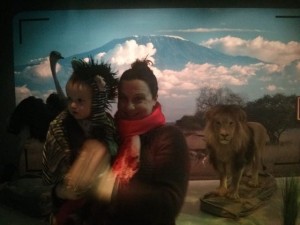 New Years Day was boring—what a wondrous indulgence is that in this day and age? Although we did have our first meal of the year at Fanny Chadwick’s for brunch, which was delicious, and Iris has been transformed into someone who is fairly respectable about restaurant behaviour from all her practice this holiday. And Harriet and I got to play Scrabble for Juniors, which is almost as excellent as spending New Year’s reading in bed. Yesterday we went to the ROM to see the Wildlife Photography exhibit. And yes, more skating. Today we’re doing nothing, which might prove to be a bad idea but feels pretty good from where I sit (on the couch, wearing jogging pants, watching snow falling outside). We’ve kept things a little special with scones with jam and Devonshire cream, because I had a jar of the latter in the fridge and we had to use it up—not the worst task to be charged with.
New Years Day was boring—what a wondrous indulgence is that in this day and age? Although we did have our first meal of the year at Fanny Chadwick’s for brunch, which was delicious, and Iris has been transformed into someone who is fairly respectable about restaurant behaviour from all her practice this holiday. And Harriet and I got to play Scrabble for Juniors, which is almost as excellent as spending New Year’s reading in bed. Yesterday we went to the ROM to see the Wildlife Photography exhibit. And yes, more skating. Today we’re doing nothing, which might prove to be a bad idea but feels pretty good from where I sit (on the couch, wearing jogging pants, watching snow falling outside). We’ve kept things a little special with scones with jam and Devonshire cream, because I had a jar of the latter in the fridge and we had to use it up—not the worst task to be charged with.
 And I’m writing it all down now mostly so that I can remember it, the holiday we were so desperate for and which so delivered. I’m writing it all down because all these ordinary things (libraries and lunches) are so easy to forget, and I don’t want to. I don’t want to forget either that we’re so blessed with friends and family and each other. If how you spend your days are indeed how you spend your life, then these past two weeks are an indication that we’re doing something right. And it’s something to hold on to as the lights of December fade—let the next few months be something more than just a countdown to spring.
And I’m writing it all down now mostly so that I can remember it, the holiday we were so desperate for and which so delivered. I’m writing it all down because all these ordinary things (libraries and lunches) are so easy to forget, and I don’t want to. I don’t want to forget either that we’re so blessed with friends and family and each other. If how you spend your days are indeed how you spend your life, then these past two weeks are an indication that we’re doing something right. And it’s something to hold on to as the lights of December fade—let the next few months be something more than just a countdown to spring.





